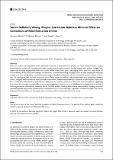| dc.contributor.author | Martel, Cameron | |
| dc.contributor.author | Mosleh, Mohsen | |
| dc.contributor.author | Rand, David Gertler | |
| dc.date.accessioned | 2021-02-09T16:25:43Z | |
| dc.date.available | 2021-02-09T16:25:43Z | |
| dc.date.issued | 2021-02 | |
| dc.date.submitted | 2020-07 | |
| dc.identifier.issn | 2183-2439 | |
| dc.identifier.uri | https://hdl.handle.net/1721.1/129719 | |
| dc.description.abstract | How can online communication most effectively respond to misinformation posted on social media? Recent studies examining the content of corrective messages provide mixed results—several studies suggest that politer, hedged messages may increase engagement with corrections, while others favor direct messaging which does not shed doubt on the credibility of the corrective message. Furthermore, common debunking strategies often include keeping the message simple and clear, while others recommend including a detailed explanation of why the initial misinformation is incorrect. To shed more light on how correction style affects correction efficacy, we manipulated both correction strength (direct, hedged) and explanatory depth (simple explanation, detailed explanation) in response to participants from Lucid (N = 2,228) who indicated they would share a false story in a survey experiment. We found minimal evidence suggesting that correction strength or depth affects correction engagement, both in terms of likelihood of replying, and accepting or resisting corrective information. However, we do find that analytic thinking and actively open-minded thinking are associated with greater acceptance of information in response to corrective messages, regardless of correction style. Our results help elucidate the efficacy of user-generated corrections of misinformation on social media. | en_US |
| dc.publisher | Cogitatio | en_US |
| dc.relation.isversionof | http://dx.doi.org/10.17645/mac.v9i1.3519 | en_US |
| dc.rights | Creative Commons Attribution 4.0 International license | en_US |
| dc.rights.uri | https://creativecommons.org/licenses/by/4.0/ | en_US |
| dc.source | Media and Communication | en_US |
| dc.title | You’re Definitely Wrong, Maybe: Correction Style Has Minimal Effect on Corrections of Misinformation Online | en_US |
| dc.type | Article | en_US |
| dc.identifier.citation | Martel, Cameron et al. "You’re Definitely Wrong, Maybe: Correction Style Has Minimal Effect on Corrections of Misinformation Online." Media and Communication 9, 1 (February 2021): 120-133 © 2021 Authors | en_US |
| dc.contributor.department | Sloan School of Management | en_US |
| dc.contributor.department | Massachusetts Institute of Technology. Department of Brain and Cognitive Sciences | en_US |
| dc.relation.journal | Media and Communication | en_US |
| dc.eprint.version | Final published version | en_US |
| dc.type.uri | http://purl.org/eprint/type/JournalArticle | en_US |
| eprint.status | http://purl.org/eprint/status/PeerReviewed | en_US |
| dspace.date.submission | 2021-02-04T17:58:30Z | |
| mit.journal.volume | 9 | en_US |
| mit.journal.issue | 1 | en_US |
| mit.license | PUBLISHER_CC | |
| mit.metadata.status | Complete | |
